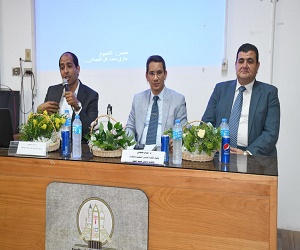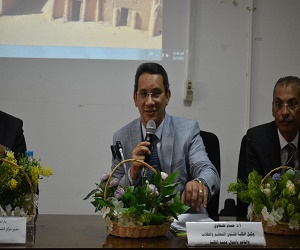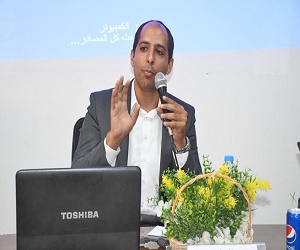A lecture at the Faculty of Archeology, Ain Shams University, entitled “Transformation to a Green University in the Light of Climate Changes and Carbon Footprint”
Under the patronage of Prof. Dr. Mahmoud El-Matini, President of Ain Shams University and the supervision of Prof. Dr. Hossam Tantawy, Acting Dean of the Faculty of Archeology, the Faculty of Archeology at Ain Shams University organized a lecture entitled "Transformation into a green university in light of climate changes and carbon footprint", in preparation for organizing Conference of the Parties to the United Nations Convention on Climate Change (COP27).
Dr. Ahmed Al-Awadi, Director of the Center of Excellence for Sustainability at the university, during which he lectured in the presence of Prof. Dr. Hossam Tantawy, Acting Dean of the Faculty of Archeology and Vice Dean for Education and Student Affairs, Prof. Dr. Ahmed Al-Shawky, Vice Dean of Graduate Studies and Research Affairs and General Supervisor of the Community Service and Environmental Development Affairs Sector The faculty and a number of faculty members, the supporting staff, students and employees
In his speech Prof. Dr. Hossam Tantawy, Acting Dean of the Faculty, confirmed that Ain Shams University is one of the leading universities in the climate change file, and has taken many measures to transform into a green university, including the issuance of a decision to establish a Center of Excellence for Sustainability, the higher administration of the university also recommended that a series of lectures be held in all faculties of the university, coinciding with the beginning of the new academic year, in preparation for the COP27 conference, to raise awareness of the university community on this important subject.
 |
 |
 |
||
Dr. Ahmed Al-Awadi, the lecture began by presenting a definition of the environment, pointing out that it includes 3 aspects, the natural environment, the economic aspect, and the social aspect. Most of the current problems are due to the economic and social aspect being given precedence over the natural environment.
Dr. Ahmed Al-Awadi discussed the Conference of the Parties to the United Nations Convention on Climate Change (COP27), the preparations for the conference, and what is expected of it within a year until Egypt submits the file on climate change to the upcoming COP28 conference, which is scheduled to be held in the UAE.
Also review what is meant by carbon footprint and the reasons that lead to an increase in carbon emissions, including some simple daily practices, he also dealt with the definition of the phenomenon of climate change, its causes and effects, and measures of adaptation and mitigation of the effects of climate change, explaining the difference between mitigation measures to reduce the negative effects of climate changes by taking different measures such as the use of clean energies, while adaptation is coexistence with the situation that cannot be changed.
Finally, Dr. Ahmed Al-Awadi touched on some of Ain Shams University’s efforts to transform into a green university, including the establishment of the first institute for environmental studies in the Middle East 40 years ago, which later turned into the Faculty of Graduate Studies and Environmental Research, which is currently hosting the Green Transformation Unit.
The Center of Excellence for Sustainability has also been established, which provides lectures and awareness seminars, adding some content to courses and electronic platforms on climate change, increasing the number of researches that provide for sustainability, and reconsidering afforestation and energy on campus.
The university also takes into account the new buildings that are environmentally friendly, as the Innovation and Entrepreneurship Building was established to save water and energy, and to illuminate the campus with solar light poles, in addition to many innovations in the Faculty of Computing and the Faculty of Engineering, it also addressed the university's efforts to digital transformation (digitization) to reduce paper use.
The meeting witnessed an exchange of views with the students to know the extent of their knowledge and information about climate change and the carbon footprint and to answer all inquiries.
.svg)




